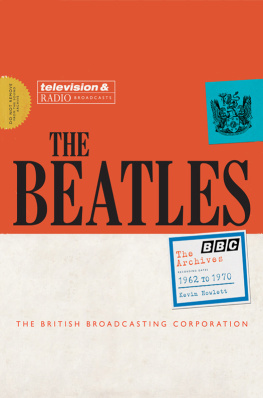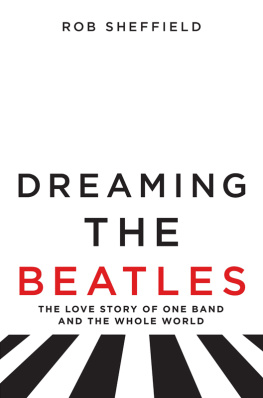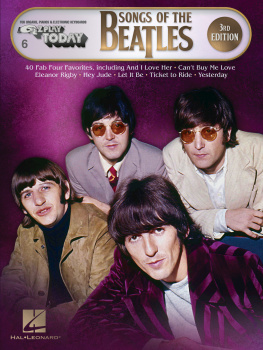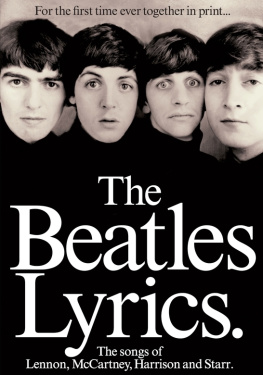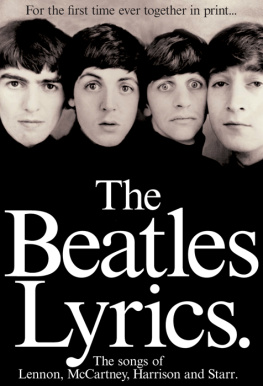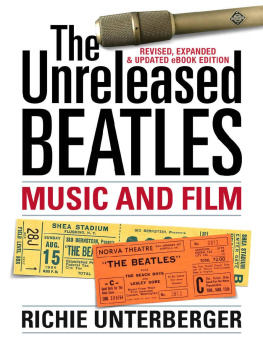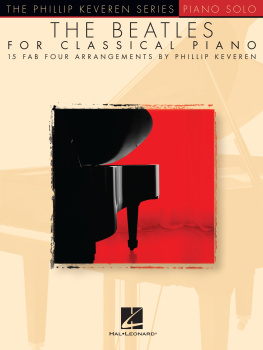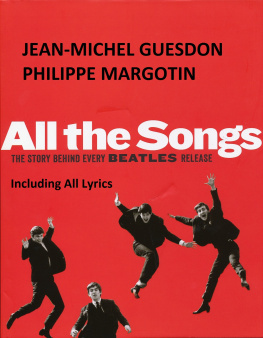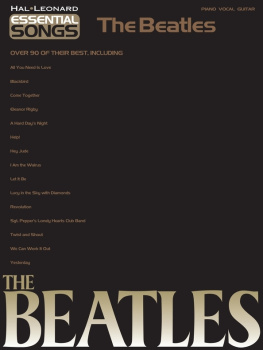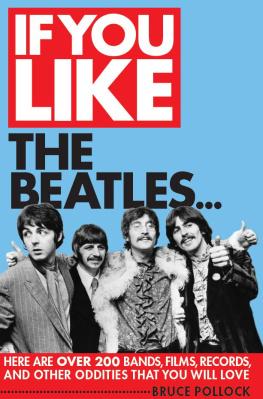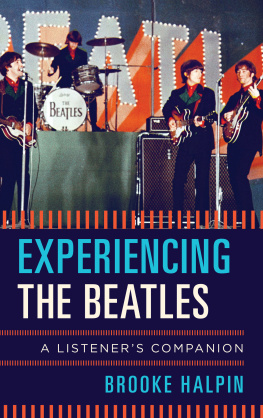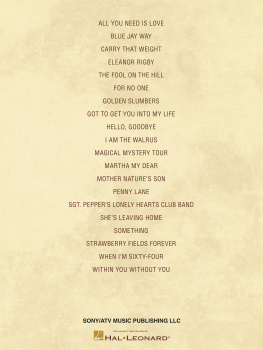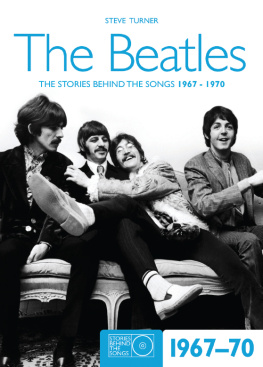

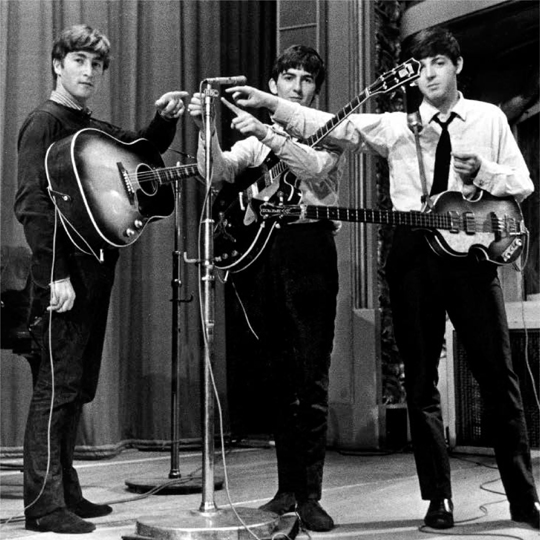
CONTENTS

The past is a foreign country: they do things differently there.
(L.P. Hartley, The Go-Between)
The Beatles arrived at the BBC for a radio audition in February 1962. At this time, the BBC was at the core of daily life in the UK. In the harrowing days of the Second World War it had provided news, laughter and comfort. During the post-war years of food rationing and austerity, the time of day was measured by the theme tunes of Two-Way Family Favourites, The Archers, Housewives Choice and Music While You Work. In the daytime, there was nothing else to listen to but the BBC, and during the limited hours that TV was broadcast its only competitor was the young commercial upstart, Independent Television. Todays multi-channel broadcasting world rarely unites the country the way radio and TV did during the 1960s. In that era, BBC TV and radio programmes attracted weekly audiences of twenty million or more.
The invitation for the four lads from Liverpool none older than 21 to attend an audition at the BBCs Manchester outpost was a significant step forward in their career in show business. There is a sketch on The Beatles Fan Club Christmas record for 1967 Christmas Time (Is Here Again) that conveys how daunting it could be to cross the threshold of the British Broadcasting Corporation:
Narrator: The boys arrive at BBC House.
THREE LOUD KNOCKS ON A DOOR
Man from the BBC: [Sternly] What do you want?
The Beatles: We have been granted permission, Oh Wise One.
Man from the BBC: Ah! Pass in peace.
Pretty soon though, The Beatles were acting like they owned the place. BBC Television was fairly late to recognize the groups potential, but they regularly appeared on the radio to perform music and chat amiably to announcers. Except for comedians, regional accents were not heard much on the wireless in those days. Part of the fun of the early broadcasts is hearing The Beatles natural voices bumping up against the well-modulated tones of trained actors, who presented many of the shows. The appeal of the group never came just from their music. Playful in the early days, thoughtful and confessional towards the end the BBC interviews reveal the personal charm of four men who entranced the world. As The Beatles story unfolds through many radio and TV appearances, their emotions are palpable ranging from bewilderment on the first exciting day in New York City in 1964 to anxious preoccupation with business affairs in 1969.
In 1982, I produced a BBC Radio 1 special called The Beatles at the Beeb. The BBC had been meticulous about keeping paperwork relating to its broadcasts, so it was fairly straightforward to discover on which programmes The Beatles appeared and the songs they played. In the BBC Contracts Department there was a room full of filing cabinets containing card indexes. The section for The Beatles included handwritten entries with all the recording and transmission dates of their bookings. The BBC also had a store of microfilm spools that preserved running orders with music details. Armed with a list of programme names and dates, The Beatles BBC session history was soon revealed as I cranked the microfilm through the viewer.
Counting a highlights programme for the 1963 Royal Variety Performance, the group played music on 53 radio shows between March 1962 and June 1965. No fewer than 275 unique musical performances by The Beatles were broadcast by the BBC in the UK. The group played 88 different songs on radio some recorded many times; others performed just once. Remarkably, 36 of those songs were never issued on record while the group was in existence. With the exception of the Lennon-McCartney original Ill Be On My Way, these unreleased tracks comprised cover versions of familiar rock n roll numbers, current rhythm and blues songs and a few oddball choices.
These facts were tantalizing in 1982. Now, where were the tapes? The BBC Sound Archive in Broadcasting House had catalogued one vinyl disc with BBC-recorded songs by The Beatles. On one side of this Archive LP, there was an edited version of the Easter Monday holiday special From Us To You, broadcast on 30 March 1964. Made for the BBC Transcription Service to distribute to international radio stations, it did not have all the songs from the domestic programme. That was it. There had been 53 programmes with Beatles music; just one was in the Archive. Fortunately, following the international success of The Beatles and other British artists, BBC Transcription discs had soon begun to carry pop music sessions. The weekly show Top of the Pops was launched in 1964 (completely unrelated to the TV programme with the same name) and songs from four of the last five Beatles sessions were included in the show heard around the world. The Top of the Pops LPs were filed in the Transcription Service Library. There were now more songs to consider for The Beatles at the Beeb than just the five in From Us To You.
But 39 of The Beatles sessions were broadcast in 1963 and the scripts showed that Pop Go The Beatles had been a treasure trove of unreleased songs. Through luck rather than managerial foresight, fifteen songs from that series had survived. In 1965, the BBC General Overseas Service aired fifteen-minute shows called Pop Go The Beatles featuring songs from those programmes and other sessions from 1964. At some point, a studio manager made a highlights tape for his colleagues to listen to during downtime on night shifts at Bush House the home of the General Overseas Service. The Bush Tape had fifteen songs The Beatles had never released on record. What a thrill it was to listen to that reel for the first time.
The forthcoming broadcast of so many rare tracks made The Beatles at the Beeb a big news story around the world. Following its first Radio 1 broadcast, the show was heard on US radio and in other countries. I returned to the material again in 1988 to produce fourteen half-hour shows called The Beebs Lost Beatles Tapes. In the six years between the projects, many off-air recordings of The Beatles programmes had surfaced on bootleg albums. Producer Bernie Andrews had kept copies of two of his programmes with The Beatles and generously allowed them to be broadcast in 1988.
In November 1994, 56 of the BBC session songs were commercially released on Live At The BBC. By this time, an additional source of high-quality material had been found and used for some of the tracks on the album. No one at EMI was quite sure about the market for Live At The BBC. However, its release became headline news and, following this publicity, the record company was caught out. EMIs Head of Communications David Hughes admitted, Demand is continuing to outstrip supply. Were trying to keep everybody partly supplied and are making copies as fast as we can. In fact, five million copies were sold around the world within six weeks.
When The Beatles BBC radio sessions were recorded, there was very little understanding that they might have some historic or commercial value in the future. Several programmes were kept at the BBC by chance, while others were preserved by producers, engineers and home tapers. The Beatles early BBC television appearances were also subject to similar odds of survival. Two key programmes from 1963
Next page
